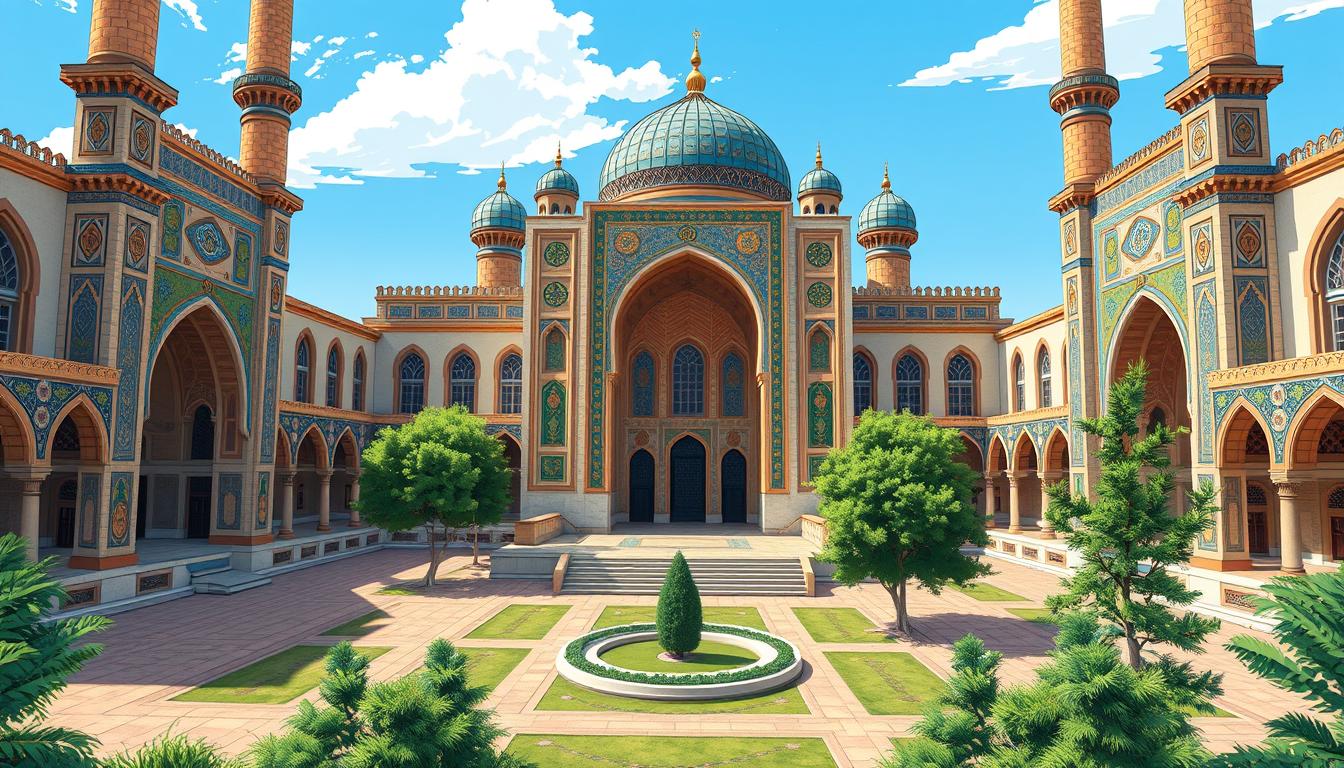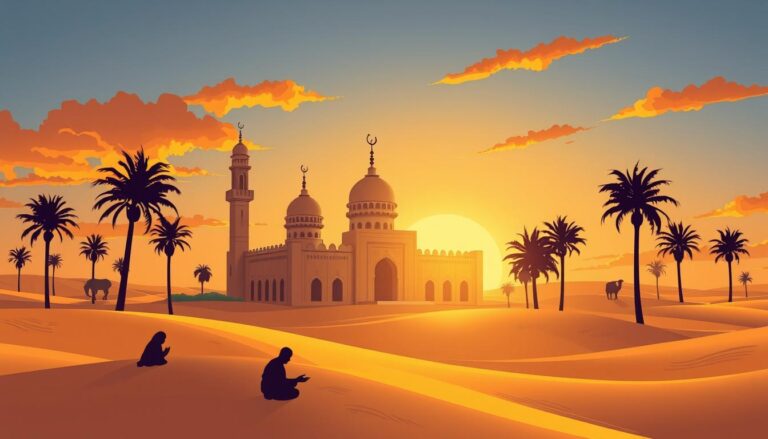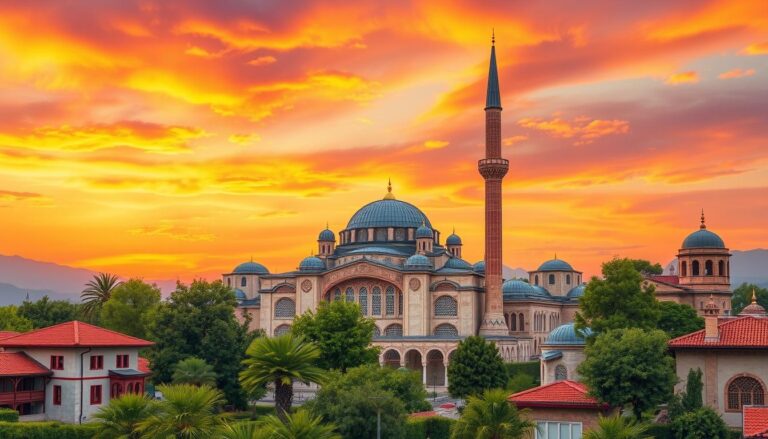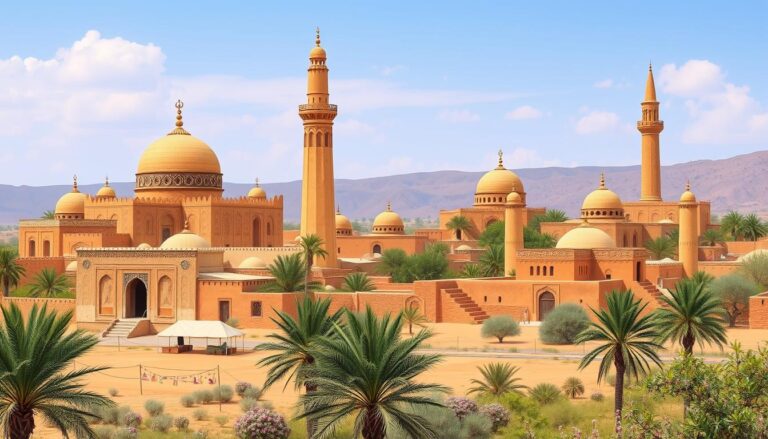Islam in Uzbekistan
Islam is the main religion in Uzbekistan. Most people follow the Sunni branch, especially the Hanafi school. The country’s Islamic history is rich, thanks to leaders like Muhammad al-Bukhari and Tamerlane.
But, Islam in Uzbekistan isn’t uniform. Since the Uzbek Soviet Republic started, many different ways of practicing Islam have emerged. These practices are often more relaxed than strict Islamic traditions seen in some parts of the Middle East.
Uzbekistan also keeps traditions from before Islam, like Zoroastrianism. This shows the country’s diverse cultural background.
The Muslim Board of Uzbekistan has the Mushaf Othmani, the oldest Quran copy. This highlights Uzbekistan’s important Islamic heritage and its role in Central Asia’s Islamic culture.
The Predominance of Islam in Uzbekistan
Islam has a long history in Uzbekistan. Most people in the country follow this faith. About 96.3% of Uzbekistan’s population is Muslim, making it very religiously homogenous.
Demographics and Statistics
The Muslim population in Uzbekistan mostly follows Sunni Islam. Around 54% are non-denominational Muslims, and 18% are Sunni. Only 1% are Shia Muslims. Also, about 11% of Uzbek Muslims are part of Sufi orders, a mystical part of Islam.
Uzbekistan also has Christians, with about 9% of the population being Christian Orthodox. Other religious and non-religious groups make up 4%. The Jewish community has shrunk, with only 5,500 Jews left in Uzbekistan as of 2022.
Uzbekistan is seen as a cultural and religious center in Central Asia. Its cities and towns are key places for Islamic learning and spiritual practices. The country is known for its Islamic architecture, literature, and art, showing its strong ties to Islam.
“Uzbekistan has a unique and diverse religious landscape, with Islam as the predominant faith, deeply woven into the cultural fabric of the country.”
The Islamic Golden Age in Central Asia
Uzbekistan and Central Asia were key during the Islamic Golden Age, from the 8th to the 13th century. This time saw a huge growth in Islamic culture. The area became a top place for science, medicine, philosophy, and new ideas.
Islam spread here thanks to the Iranian Samanid rulers. They worked hard to convert many Turkic peoples. This led to a rich intellectual and cultural scene.
Samarqand became a major center for Islamic studies, starting the Timurid Renaissance. Scholars like Imam Bukhari and Imam Tirmidhi made big contributions. Their work is still valued today.
The Ulugh Beg Observatory in Samarqand kept the Maragha school’s astronomy tradition alive. Ali Qushji worked there and later in Istanbul. His work might have inspired Nicolaus Copernicus.
The Timurid Renaissance and scholars from Uzbekistan were vital in the Islamic Golden Age. They made Samarqand a key place for Islamic studies. This legacy still shapes the region’s culture and knowledge.
Islam in Uzbekistan: A Historical Perspective
The history of Islam in Uzbekistan began in the 8th century with the Arab invasion. This event ended the region’s religious diversity and made Islam the main faith. The defeat of the Chinese forces by the Turks in the Battle of Talas in 751 was a key moment for Islam in Central Asia.
In the 9th century, the Samanid dynasty united Central Asia. This was a time of great growth in politics, culture, and economy. Bukhara became a major center in the Islamic world, alongside Baghdad, Cordoba, and Cairo.
Medieval Islamic Influence
In the 11th century, the Karakhanids and the Ghaznavids strengthened Islam’s hold in the region. The Seljuks, a Turkic tribe, then conquered Byzantine Anatolia. This solidified their control over the area.
The Mongol Karakhitai later ruled from western China to the Aral Sea. But Khorezmshah Mohammed freed Samarkand in the early 13th century. These events shaped Uzbekistan’s Islamic identity, making it a center of religion and culture.
“The Arab invasion brought an end to the diversity of religions in the region, replacing Zoroastrianism and other faiths with Islam.”
After the Soviet Union broke up in 1991, Uzbekistan gained independence. But the Uzbek government’s crackdown on independent Islamic worship has been a big challenge. The government’s push for state-sponsored Islam has limited the growth and expression of Islam in the country.
The Soviet Era and the Regulation of Islam
During the Soviet era, Islam in Uzbekistan faced big challenges and strict rules. The government wanted to control religious activities. The Jadidism movement, which grew during the Russian Empire, was opposed and suppressed by the Soviets.
In the early Soviet years, mosques and religious schools were shut down. By 1941, only about a thousand mosques were left from the 26,000 in 1912. The Spiritual Board of Muslims of Central Asia and Kazakhstan (SADUM) was set up to manage Islam. The government checked who could work in Islamic organizations.
The Babakhan dynasty led SADUM for three generations. Ishan Babakhan (1861-1957) started it, followed by his son Ziyauddin Khan (1908-1982). They published a journal, Muslims of the Soviet East. But, the government aimed to limit Islam’s influence, not promote it.
The Regulation of Islam in Uzbekistan during the Soviet era was complex. The government’s efforts to suppress Islam greatly affected its practice and expression in the region.
Islam in Uzbekistan
After the Soviet Union fell in 1991, Muslims in Uzbekistan could practice their faith openly. Mosques were built with donations and aid from abroad. Religious schools opened, and young people learned more about Islam in post-Soviet Uzbekistan.
The government, led by Islam Karimov, saw religious freedom in Uzbekistan as a way to build national identity. They saw any new or independent Islam as a threat. This was because of violence in neighboring countries and Islam’s potential as a political force in Uzbekistan.
Challenges to Islamic Practices
The government cracked down on independent Muslims. They arrested people without reason, made some religious leaders disappear, and closed independent mosques. They wanted to control Islamic practices in Uzbekistan to keep power to themselves.
“The Karimov government regarded any innovation or independent Islam as threatening, both in light of the violence that had wracked Tajikistan and Afghanistan and because Islam remained one of the few potential forces for alternative political organization in Uzbekistan.”
Despite the challenges to Islamic practices in Uzbekistan, Islam has seen a comeback. The government sees Islam as part of the country’s heritage. But they still control religious institutions and education tightly.
The Role of the Muslim Board of Uzbekistan
In Uzbekistan, the Muslim Board, or Muftiate, is key in managing Islam. It was set up after the country gained independence. It handles tasks like registering mosques and picking imams, and even what sermons should say.
The Mufti leads the Muslim Board, showing the government’s control over Islam. The Muftiate’s YouTube channel, Muslim.uz, has 379,000 followers. This shows its big impact online.
The government also watches over Islam closely. People can face serious trouble for sharing religious stuff online or teaching religion privately without permission.
“The law on Freedom of Conscience and Religious Organizations criminalizes unregistered religious activity, requires official approval for religious publications, and prohibits proselytism and private religious education.”
Human rights groups have spoken out against Uzbekistan’s strict rules. They say there’s pressure on schoolgirls to wear headscarves and against changing faiths.
The government’s tight grip on the Muslim Board shows the fine line between freedom and security in Uzbekistan.
Contemporary Issues and Debates
Uzbekistan is finding it hard to balance religious freedom and security. The government has eased some restrictions on Islam, but now it’s tightening control again. This change is under President Mirziyoev.
There’s worry about “religious radicalization” and practices like polygamy and praying at work. The government is introducing fines for things like unregistered Islamic marriages and certain clothes. They’re worried about Islam becoming a political force against secularism.
Balancing Religious Freedom and Security Concerns
The government wants to allow religious freedom but also keep control. They’re worried about “Islamic ecosystems” that might challenge the state. This has led to more rules and checks on religious practices, like quieter call to prayer times.
There have been detentions and beard shavings of religious believers. Laws now impose fines for things like unregistered Islamic marriages and certain clothes. This is all about keeping the state’s control.
“The government is trying to balance allowing religious freedom with maintaining control and preventing the growth of ‘Islamic ecosystems’ that could challenge the state.”
Despite these rules, some want a stricter Islam than the government supports. Bloggers and online platforms talking about Islam have faced censorship and legal trouble. They’re sharing their views on Islamic issues.
The government’s stance on Islam in Uzbekistan is a tricky balance. They’re trying to keep control while addressing security concerns and respecting religious freedom.
Islamic Education and Intellectual Discourse
In Uzbekistan, Islamic education and intellectual talks have seen big changes since it gained independence. After the Soviet Union fell, religious schools reopened. Young people were excited to learn more about Islam.
This new interest in Islamic studies was a big change. Before, the government had tightly controlled religious education.
But, the government’s view on Islamic education has changed over time. In 1998, they shut down the Islamic studies department at the Institute for Oriental Studies. This move showed a shift towards more control.
The government sees independent Islamic education and talks as threats. They have harassed and detained religious bloggers and others who talk about Islam outside of approved channels.
Today, Islamic education in Uzbekistan is complex. The country has 2,323 religious groups, with 2,132 being Islamic. But, the government’s way of regulating these groups is still a topic of debate and tension.
Despite these issues, Islamic intellectuals in Uzbekistan are key in shaping the country’s religious and cultural scene. The comeback of Islamic studies in Uzbekistan has made people focus more on Islamic education system. This includes adding “History of Religious Culture” to school curricula in countries like Kyrgyzstan and making religious studies compulsory in Kazakhstan.
“In the field of religious education in Uzbekistan, it is organized in three capacities: professional religious education in theology (madrasas, Tashkent Islamic Institute, seminaries); academic education in religion in secular educational institutions including public schools and higher education; and domestic religious education primarily provided within families.”
As Uzbekistan tries to balance religious freedom with security, the role of Islamic education and talks will keep being discussed and shaped by policies.
Conclusion
The story of Islam in Uzbekistan is deeply rooted in history. It began in the 8th century and grew through the Islamic Golden Age. This period made the region a center of learning and science.
But, Islam faced big challenges, especially during the Soviet era. The government then controlled and limited its practice. After gaining independence, Uzbekistan saw a rise in Islamic observance again.
Yet, the government still tries to balance religious freedom with keeping control. This balance is hard to achieve. It leads to debates about Islam’s role in Uzbekistan’s society and government.
Summary of Islam in Uzbekistan: Islam’s history in Uzbekistan is complex. It spans from its early spread to the challenges of the Soviet era. Today, there are debates about Islam’s place in society and governance.
Source Links
- Islam in Uzbekistan
- UZBEKISTAN
- Religion in Uzbekistan
- Uzbekistan (12/08)
- Central Asia’s Golden Age (800–1100): Why it Happened, Why it Ended
- History of Uzbekistan
- Uzbek history – Arrival of Islam
- Islam in Uzbekistan
- The Rise of Political Islam in Soviet Central Asia
- Religious Policy in Uzbekistan
- Uzbekistan’s Islamic Revival, Online
- Islam and Secular State in Uzbekistan: State Control of Religion an…
- Measuring the Power and Legitimacy of Uzbekistan’s Islamic Leaders
- Uzbekistan – United States Department of State
- Uzbekistan Turning Down The Volume On Islam
- It’s Karimov Era 2.0 for Muslims in Uzbekistan
- Religion and Spirituality in Public Schools of Post-Soviet Uzbekistan
- Why Are Uzbek Youth Learning Arabic?
- Uzbekistan: Backsliding on Religious Freedom Promises
- Amid Central Asia’s Struggle with Extremism, Uzbekistan Promotes Pluralism
- 2022 Report on International Religious Freedom: Uzbekistan







